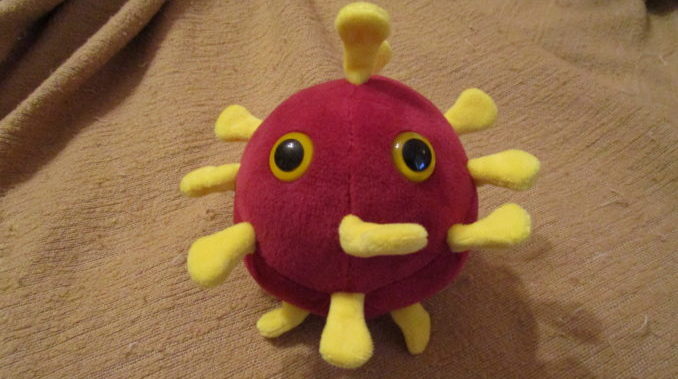
P.N. Elrod warns fledgling authors: never begin a story with the protagonist waking up. It’s boring. She’s right, but then again she’s dealing with COVID-19 right now, so every day she manages to wake up is exciting, before the pain and the coughing set in.
Meanwhile, I’m late with my post – again – because I overslept. This, too, is due to COVID-19; now that my daughter is on winter break from school, she’s sleeping in, and that allows us to shift our postal delivery schedule back to the middle of the night, when the post office where we drop packages is far less of a plague box. That in turn has me sleeping in.
Are we overreacting? It’s possible. But Pat knows how she contracted the disease: while on an irregular run at Target, most likely from the time she was standing in line at the register with the woman behind her who had her mask down around her chin.
All that’s required is one opening in the defenses. The good news is that the overwhelming majority of the people who contract it don’t die. If there’s good medical aid around, the numbers clock in below 1 in 50, and for people under 70 the numbers are below 1 in 100. Even without any sort of help available more than 19 out of every 20 victims recover. Even the corollary issues, like weakened heart, increased chances for stroke, and nerve and capillary damage are uncommon, with the most cautionary of initial studies placing the concern at about 1 out of every 6 of those who contracted the disease having those problems.
Recognizing this can be its own issue. When we talk about the death rate of COVID-19, we risk sounding either as if contracting it is a death sentence (it’s not) or as if concerns are grossly overblown (they’re not.) When we focus on secondary problems the same principle applies: they occur, and we must all watch out for them, but it doesn’t mean that they’re certain or even likely to manifest. The odds are against it. Most people who recover from the virus will be fine. But there are new risks and they must be considered.
“Keep It Simple, Stupid” or KISS is a principle used in designing mechanical, electrical and other systems. It suggests that systems work best with as few parts and complications as possible, and it tends to work. It’s also very helpful as an educational tool; people learn and comprehend things better when there are fewer variables to work with. It is for this reason that, when we teach children a word for the first time, we focus on a single meaning: “Butter” is depicted as a pat of the oleaginous dairy substance. Only afterward to we expand it to include the verb form of spreading something onto another or products of similar consistency made from products like nuts or cookies.
In life, little is simple. The most basic of interactions and mechanisms – looking at a white wall, for example – involves a massive array of complex interactions, as light from various sources and angles reflect off of that wall (with the grain of the paint possibly producing subtle textural and shadow variations to accentuate the hue), hitting the eye and being transformed by the rods and cones into information which is usable by the remainder of the eye to transmit information to the brain.
The same principle holds when dealing with the problem of COVID-19. There are far more variables at play than simply whether people will live or die, and it’s unfair to unnecessarily heighten the fear of those who have contracted the disease. Worse, when the discussion is allowed to be broken down to the inaccurate extremes, it becomes easy for people to choose sides… and invariably, some people will pick the wrong side.
We’re very close to the end of this nightmare, and people need only keep themselves safe for a few more weeks. The focus needs to be on maintaining a conversation wherever possible. There are massive social pressures being put on people to get together with friends and family right now – it’s the end of the year when such things happen, and we’re being told that the vaccines will end the virus – and it’s going to be very alluring to many to simply abandon many of their cautions. Many of them are not bad people, but they’re being tempted into stupidity. If we find ourselves dealing with them our efforts need to be to get them to focus on the complexity of the issue. Simply yelling at them from one side or the other won’t help.
